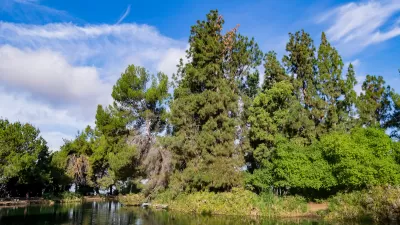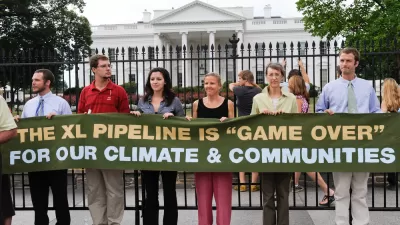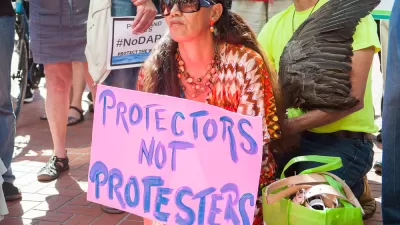President Biden's executive order may put the final nail in the coffin of the controversial pipeline project, but it was unwavering local activists who kept the pressure on for a decade.

The Keystone XL pipeline, which, along with the Dakota Access Pipeline, became a buzzword and a political lightning rod during the Trump administration, may finally be dead thanks to an executive order signed by President Biden rescinding a prior permit. But, according to Yessenia Funes writing for Atmos, it is the frontline Indigenous organizers, working tirelessly for the last ten years to stop the project, that deserve the real credit.
Since 2011, Joye Braun has been a key part of the fight against the pipeline. In the beginning, residents like her primarily worried about protecting important waterways and sacred lands. Since then, climate change and greenhouse gas emissions have become urgent global concerns. "Braun has seen former President Barack Obama (with Biden alongside him) kill the 1,179-mile pipeline only to see Trump resurrect it. That’s why she calls it a 'zombie pipeline.'"
Activists are cautiously optimistic that Biden's action will stop the pipeline for good. "Tribal nations in the U.S. are sovereign nations with treaty rights. All they ask is that the federal government and private companies treat them as such and leave their water and lands alone."
FULL STORY: RIP Keystone XL

Study: Maui’s Plan to Convert Vacation Rentals to Long-Term Housing Could Cause Nearly $1 Billion Economic Loss
The plan would reduce visitor accommodation by 25,% resulting in 1,900 jobs lost.

North Texas Transit Leaders Tout Benefits of TOD for Growing Region
At a summit focused on transit-oriented development, policymakers discussed how North Texas’ expanded light rail system can serve as a tool for economic growth.

Using Old Oil and Gas Wells for Green Energy Storage
Penn State researchers have found that repurposing abandoned oil and gas wells for geothermal-assisted compressed-air energy storage can boost efficiency, reduce environmental risks, and support clean energy and job transitions.

Private Donations Propel Early Restoration of Palisades Playground
Los Angeles has secured over $1.3 million in private funding to restore the Pacific Palisades playground months ahead of schedule, creating a modern, accessible space that supports community healing after recent wildfires.

From Blight to Benefit: Early Results From California’s Equitable Cleanup Program
The Equitable Community Revitalization Grant (ECRG) program is reshaping brownfield redevelopment by prioritizing projects in low-income and environmental justice communities, emphasizing equity, transparency, and community benefits.

Planting Relief: Tackling Las Vegas Heat One Tree at a Time
Nevada Plants, a Las Vegas-based nonprofit, is combating the city’s extreme urban heat by giving away trees to residents in underserved neighborhoods, promoting shade, sustainability, and community health.
Urban Design for Planners 1: Software Tools
This six-course series explores essential urban design concepts using open source software and equips planners with the tools they need to participate fully in the urban design process.
Planning for Universal Design
Learn the tools for implementing Universal Design in planning regulations.
Ascent Environmental
Borough of Carlisle
Institute for Housing and Urban Development Studies (IHS)
City of Grandview
Harvard GSD Executive Education
Toledo-Lucas County Plan Commissions
Salt Lake City
NYU Wagner Graduate School of Public Service





























